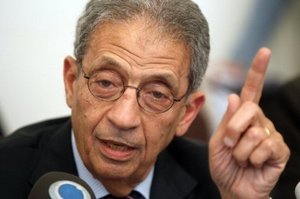
(AFP Photo/Khaled Desouki)
Amr Moussa has vehemently denied that he met with Israeli supermarket mogul, Rami Levy, in the Palestinian town of Nablus.
“There has been a lot of talk about that,” said Lamia Kamel, a spokesperson for Moussa, “accusing him of collaborating.”
Moussa was at an economic forum on Saturday in Nablus. The meeting was attended by 700 delegates from around the world including Munib Al-Masry the billionaire Palestinian. Al-Masry hosted the forum at his mansion overlooking the sprawling town of Nablus in the north of the West Bank.
“This was held under the auspices of the World Economic Forum in preparation for Davos,” said Moussa’s representative, Ahmed Salah Kamel, referring to the annual meeting held in Switzerland.
Kamel confirmed there were representatives from Israeli civic society present, but that Moussa did not individually meet with any of them, including Levy. “Of course it was a slander campaign,” said Kamel who thought rumours were being spread about Moussa because he said the Israelis were not “partners in peace.”
The title of the meeting was “Breaking the Impasse in the Palestinian-Israeli question.” Moussa said this title was wrong, there was no impasse, but rather a total lack of a way forward. Instead, he argued at the forum, there needs to be a paradigm shift in how the region works toward peace.
The Arab Peace Initiative, created while Moussa was secretary general, was rejected by the Israeli side.
The Arab Peace Initiative was agreed upon by the Arab League in 2002. It calls for a withdrawal of Israeli forces from the occupied territories and a “just settlement” of the Palestinian refugee crisis. In exchange, Israel can normalise relations with the Arab region.
In Nablus this weekend, Moussa asked the Israeli delegates what kind of solution it was that they wanted. Kamel reported Moussa saying, “you never work toward the two-state solution, you never promise a sovereign Palestinian state, so what do you want? If you want a one-state solution, then we need to begin to talk about that. There has to be full rights for all citizens, including the full right of return.”
Moussa went on to say that he was not only concerned on behalf of the Palestinians, but also on behalf of Egyptians. “The continuation of the status quo is only a recipe for disaster, it is so explosive it cannot continue and it will affect the whole region, not just Israel and Palestine.”
The meeting was also attended by several Turkish delegations, members of the Palestinian Authority, and the United Nations. Hayat Abu Saleh from the Office of the United Nations Special Coordinator of the Middle East Peace Process confirmed that her boss, Robert Serry, was a part of the meetings in Nablus as a representative from the UN.
One peculiar addition was a group of independent representatives from the United States. While the US was not officially represented, Kamel said the Americans present gave “an apologetic speech, saying they wished the US could have been a part of this.”
While in Palestine, Moussa paid homage to the late Palestinian leader, Yasser Arafat, at his mausoleum.
Moussa also met with Palestinian Authority Prime Minister Salam Fayyad. “Fayyad complained that the Palestinians feel that the Arab Spring has consumed the Arab World and the Palestinian question is no longer important,” said Kamel.
Moussa retorted that Palestine “is the key issue. Not because of emotions or nationalism, but rather because it is the linchpin for security and economic success in the region. It is of strategic importance and it has to be answered because it is destabilizing the whole region.”
Fayyad also stated the need for a greater European and Arab role in the reunification of the two Palestinian factions, Hamas and Fatah. Moussa agreed.
While the Moussa camp could not confirm Levy’s presence at the meeting. Al-Masry has recently been meeting with Levy over a “public-private partnership for peace.”
Levy has been the target of Palestinian and international protesters because his supermarkets operate in West Bank settlements. A 24 October protest at a supermarket in the Sha’ar Benjamin settlement was violently broken up by police.



